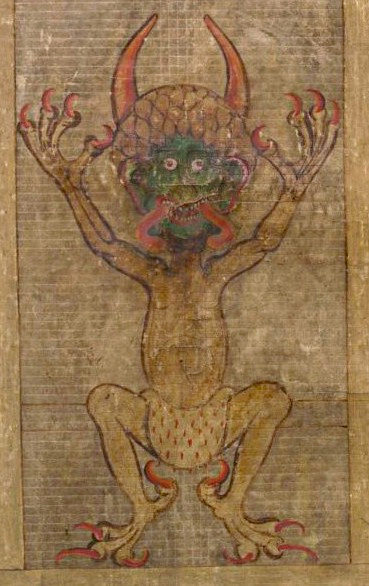Difference between revisions of "Template:Occult.live:Today's featured article"
Occultwiki (talk | contribs) |
Occultwiki (talk | contribs) |
||
| Line 1: | Line 1: | ||
[[File: | [[File:Codex Gigas devil.jpg|250px|left]] | ||
'''[[Satan]]''', also known as [[The Devil]] is an entity in the [[Abrahamic religion]]s that seduces humans into sin or falsehood. In [[Judaism]], Satan is seen as an agent subservient to God, typically regarded as a metaphor for the'' yetzer hara'', or "evil inclination." In Christianity and Islam, he is usually seen as a fallen angel that has rebelled against God, who nevertheless allows him temporary power over the fallen world and a host of [[demon]]s. In the Quran, Shaitan, also known as Iblis, is an entity made of fire who was cast out of Heaven because he refused to bow before the newly-created Adam and incites humans to sin by infecting their minds with waswās ("evil suggestions"). | |||
A figure known as ha-satan ("the satan") first appears in the Tanakh as a heavenly prosecutor, a member of the sons of God subordinate to [[Yahweh]], who prosecutes the nation of Judah in the heavenly court and tests the loyalty of Yahweh's followers. During the intertestamental period, possibly due to influence from the Zoroastrian figure of Angra Mainyu, the satan developed into a malevolent entity with abhorrent qualities in dualistic opposition to God. In the apocryphal Book of Jubilees, Yahweh grants the satan (referred to as Mastema) authority over a group of fallen angels, or their offspring, to tempt humans to sin and punish them. | |||
'''([[ | '''([[Satan|Full Article...]])''' | ||
Revision as of 20:42, 23 December 2021
Satan, also known as The Devil is an entity in the Abrahamic religions that seduces humans into sin or falsehood. In Judaism, Satan is seen as an agent subservient to God, typically regarded as a metaphor for the yetzer hara, or "evil inclination." In Christianity and Islam, he is usually seen as a fallen angel that has rebelled against God, who nevertheless allows him temporary power over the fallen world and a host of demons. In the Quran, Shaitan, also known as Iblis, is an entity made of fire who was cast out of Heaven because he refused to bow before the newly-created Adam and incites humans to sin by infecting their minds with waswās ("evil suggestions").
A figure known as ha-satan ("the satan") first appears in the Tanakh as a heavenly prosecutor, a member of the sons of God subordinate to Yahweh, who prosecutes the nation of Judah in the heavenly court and tests the loyalty of Yahweh's followers. During the intertestamental period, possibly due to influence from the Zoroastrian figure of Angra Mainyu, the satan developed into a malevolent entity with abhorrent qualities in dualistic opposition to God. In the apocryphal Book of Jubilees, Yahweh grants the satan (referred to as Mastema) authority over a group of fallen angels, or their offspring, to tempt humans to sin and punish them.
